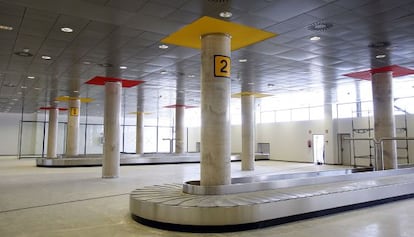Castellón airport needs a further three million euros to open
Management of notorious public project to be put out to tender by region

The airport in Castellón — which has become notorious both at home and abroad for never having received a single plane — will require a minimum additional investment of three million euros before it will receive the authorization and permission it needs to open. That’s according to the conditions included in the tender published this week by the Valencia regional government for companies interested in the commercial exploitation and maintenance of the airport.
The regional government has budgeted 25 million euros for the management of the airport over the next 20 years. But before the planes finally arrive, the region will have to finalize the documentation needed for the State Air Safety Agency (AESA) to certify that the airport complies with all of the requirements for operation. The airport is still lacking equipment and infrastructure, such as computer systems and software, the cost of which has been estimated at three million euros.
The government has decided that the company that wins the tender will have to assume this new cost. The public company Aerocas, which was set up to manage the airport project, will assume any cost overruns from the installation of the required equipment and infrastructure, according to the government documentation, “providing that it can be irrefutably proven that the planned investment of three million euros has been made.”
Former provincial leader Carlos Fabra — who is currently involved in a court case on accusations of corruption — inaugurated the airport back in March 2011. But at the time, the application for the certification process had not even begun. The time frame forecast for obtaining all of the necessary permits was six months, but the lack of proper documentation presented by the former managing company and the need to carry out further work on the airport — such as the lengthening of the runway — meant long delays.
The former managing company, Conaer, was supposed to have taken care of the certification of the airport. But a court case that saw Aerocas obliged to pay out 120 million euros for the additional work on the airport was symptomatic of Conaer’s slovenliness.
Aerocas publicly complained about the failure of Conaer to respect its commitments, not only for having left much of the work uncompleted but also because of its failure to present the documentation required.
But even after Aerocas broke off relations with the former managing company, it failed to complete the certification process. If the new tender is successful, the airport still won’t be ready to open until next year, given that the process of securing the certification will take around six months.
The details of the tender also explain that Aerocas will assume the costs of structural elements, such as repairs to the terminal. The successful managing company will then be able to choose between charging the regional government a maximum of 25 million euros over 10 years, independently of the passenger traffic achieved, or a payment system based on the number of people who arrive and leave from the airport.
The regional government opted for a new tender in the summer, after a failed attempt to sell the airport and after commissioning a new viability study.
Tu suscripción se está usando en otro dispositivo
¿Quieres añadir otro usuario a tu suscripción?
Si continúas leyendo en este dispositivo, no se podrá leer en el otro.
FlechaTu suscripción se está usando en otro dispositivo y solo puedes acceder a EL PAÍS desde un dispositivo a la vez.
Si quieres compartir tu cuenta, cambia tu suscripción a la modalidad Premium, así podrás añadir otro usuario. Cada uno accederá con su propia cuenta de email, lo que os permitirá personalizar vuestra experiencia en EL PAÍS.
¿Tienes una suscripción de empresa? Accede aquí para contratar más cuentas.
En el caso de no saber quién está usando tu cuenta, te recomendamos cambiar tu contraseña aquí.
Si decides continuar compartiendo tu cuenta, este mensaje se mostrará en tu dispositivo y en el de la otra persona que está usando tu cuenta de forma indefinida, afectando a tu experiencia de lectura. Puedes consultar aquí los términos y condiciones de la suscripción digital.








































